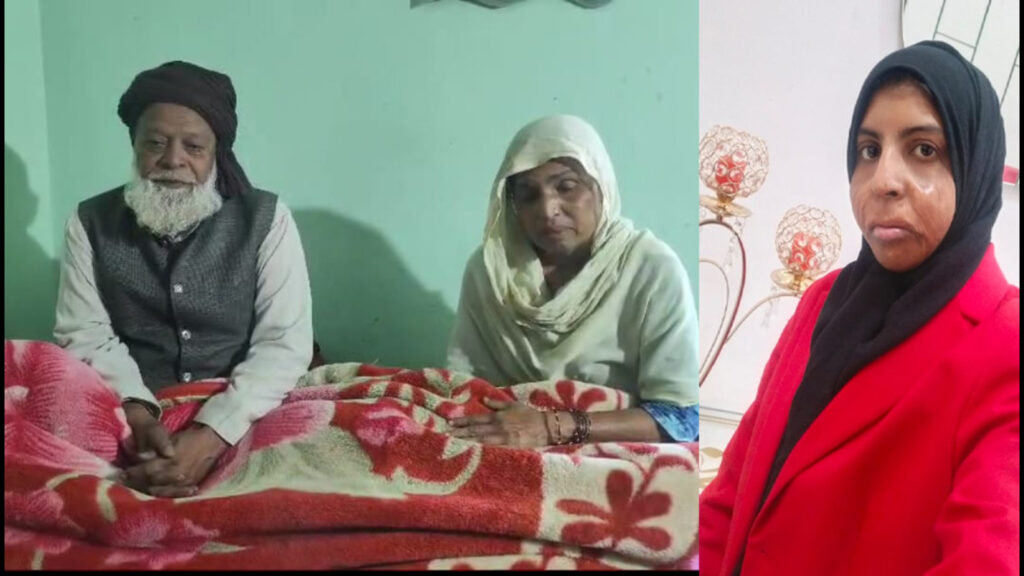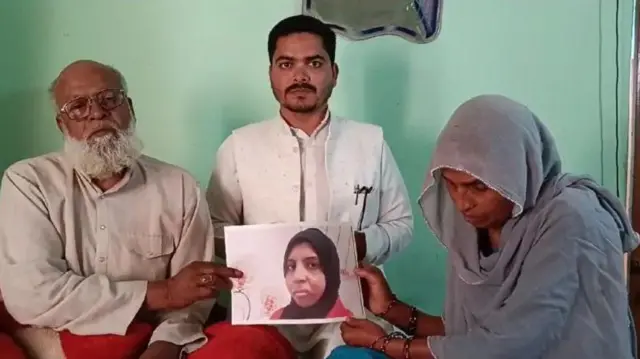Abu Dhabi / Banda, UP – In a heartbreaking and controversial case, a 33-year-old Indian woman named Shahzadi Khan was executed in the United Arab Emirates (UAE) on February 15, 2025. Shahzadi, a domestic worker from Banda district in Uttar Pradesh, was convicted of killing a four-month-old baby under her care in Abu Dhabi.
Her execution has sparked widespread emotional reactions in India and raised serious questions about legal aid, diplomatic support, and the treatment of Indian migrant workers in Gulf countries.
Who Was Shahzadi Khan?
Shahzadi Khan was a mother of two who traveled to Abu Dhabi in December 2021, hoping to earn a better income to support her family back home. Like many women from rural parts of India, she took up the job of a domestic worker, which included babysitting duties.

In August 2022, Shahzadi started working for a family that had a newborn baby. She was responsible for taking care of the infant, along with other household chores. Tragically, within a few months, the child passed away, allegedly due to injuries caused by Shahzadi.
The Incident and Arrest
The infant reportedly died on December 7, 2022, after being taken for routine vaccinations. Although hospital authorities advised a postmortem examination to determine the cause of death, the baby’s parents declined and signed a waiver, avoiding the autopsy.
Two months later, in February 2023, a video surfaced that allegedly showed Shahzadi confessing to the crime. She was arrested by local authorities shortly after. Shahzadi later stated that the confession was forced out of her through torture and threats by the child’s family and their associates.
She claimed that she was physically and mentally abused to make the confession and that she never harmed the child. However, her statement was not accepted by the court.
Legal Proceedings and Death Sentence
On July 31, 2023, the Abu Dhabi court sentenced Shahzadi Khan to death. She appealed the decision in September 2023, but her appeal was rejected. Her case then reached the UAE’s highest court—the Court of Cassation—which upheld the death sentence in February 2024.
In the UAE, the legal process can be swift and strict, especially in serious cases like murder. Shahzadi’s execution was approved and scheduled with little to no warning given to her family back in India.
Her family and lawyer had filed mercy petitions in May and July 2024, pleading for clemency on humanitarian grounds. Unfortunately, none of the requests were granted.
Family’s Plea and Allegations
Shahzadi’s father, Shabbir Khan, broke down in tears during interviews with Indian media. He claimed that his daughter was innocent and was made a scapegoat. He also said that Shahzadi had called the family one last time on February 14, a day before her execution, to say goodbye and ask for forgiveness.
Her family believes that she did not receive a fair trial and that there was a lack of proper legal support. They also criticized the Indian Embassy in the UAE, saying they did not do enough to help her. According to the family, they were not informed in time and were denied justice both abroad and at home.
Execution and Final Rites
The Indian Ministry of External Affairs (MEA) officially informed the family on February 28, 2025, that the execution had been carried out. The Indian Embassy confirmed that it had followed all local legal procedures.
Shahzadi was buried in Abu Dhabi, and her family was represented at the funeral. Indian embassy officials were also present during the last rites. However, her parents still mourn the fact that they could not see their daughter one last time.
A Bigger Question: Are Indian Workers Safe Abroad?
Shahzadi Khan’s case has highlighted the vulnerability of Indian domestic workers abroad, especially women working in the Middle East. There are nearly 3.5 million Indians in the UAE, with many employed in low-income jobs, including housework, construction, and driving.
Workers often face harsh conditions, long working hours, and in some cases, abuse from employers. Legal support is limited, and workers are sometimes unaware of their rights in foreign countries.
Shahzadi’s execution has triggered demands for the Indian government to take stronger steps in protecting its citizens working overseas. Many activists and organizations have asked for better legal support, faster diplomatic intervention, and transparent investigation procedures in such cases.
The Death Penalty in the UAE
The UAE still enforces the death penalty for serious crimes, including murder, terrorism, and drug trafficking. The punishment is usually carried out by firing squad, and executions can be swift after the final verdict.
Unlike India, where death penalty cases often go through long legal processes and presidential mercy petitions, the UAE judicial system is more direct and less open to delays.
Human rights groups have long criticized the lack of transparency in legal cases involving foreign domestic workers in Gulf countries. Shahzadi’s case is the latest example of how quickly these cases can escalate without thorough investigations.
Conclusion
The execution of Shahzadi Khan has left her family in deep sorrow and sparked national attention. Her story sheds light on the many risks that Indian workers—especially women—face in foreign countries. It also raises serious concerns about access to justice, fairness in trials, and the responsibilities of Indian diplomatic missions in protecting their citizens.
As India processes this tragedy, many are urging the government to strengthen legal aid programs for overseas workers and ensure that no one else has to face such a fate alone and unsupported.


